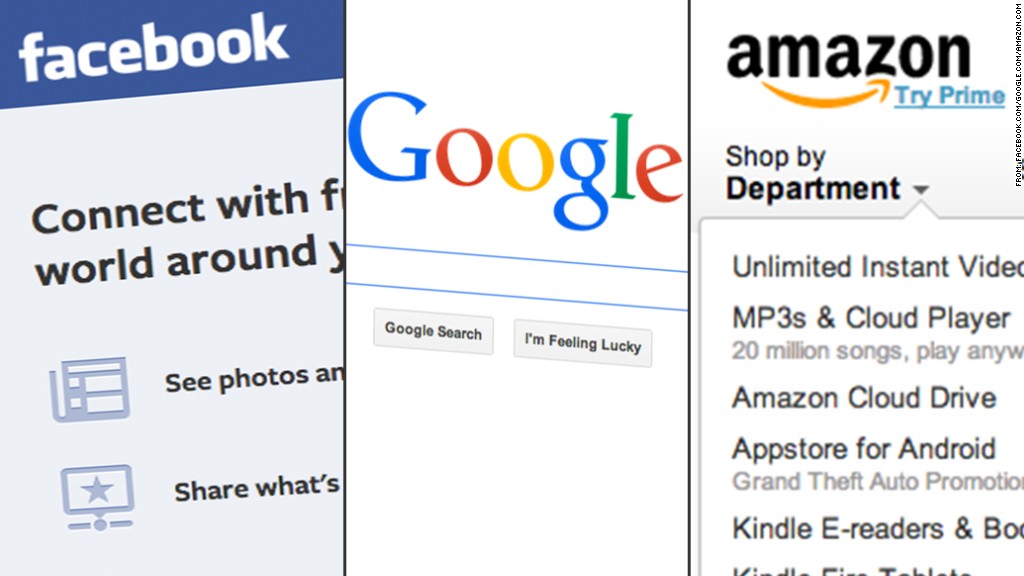
Good investors know that when the masses rush to the exits, there are often buying opportunities. After the tech sell-off this spring, it's worth asking: Are there some bargains now?
Surely all of these tech companies aren't suddenly dogs.
"Despite the pullback in valuations, the fundamentals of large cap Internet companies haven't changed," Citigroup analyst Mark May wrote in a recent note to clients.
Here are the top three to consider buying.
1.) Don't unfriend Facebook just yet
Facebook (FB) has been among the most prominent losers in the exodus from momentum stocks. But have investors gone too far?
Mark Zuckerberg's company has seen its shares tumble 18% since March 11 when shares hit a high of $72, but analysts have hardly "unfriended" (or defriended) Facebook.
In fact, the social network's current trading price leaves it a hefty 32% below Wall Street's consensus price target of $78. Moreover, a whopping 89% of analysts are bullish on the stock. It's difficult to get that many people to agree on much.
Related: Extreme IPO! GoPro plans $100M offering
Facebook could grow earnings 40% over the next three years, said Anthony DiClemente, an analyst who covers the stock at Nomura Research.
How? Just pull out your phone and check the app, among the other services the company owns. All those ads add up.
He points to Facebook's exploding mobile ad revenue, increasing ad pricing power, expansion into local markets and overseas, video ads, the soaring popularity of Instagram and potential future monetization of messaging service WhatsApp.
"There are a lot of different ways for Facebook to win and many identifiable growth drivers," said DiClemente.
Citigroup is especially enthusiastic about the stock with a $85 price target. If that comes to pass in the coming months, it will be a 44% gain from the company's closing price on Monday.
2.) Google, the 800-lb. gorilla in Silicon Valley
The company behind Gmail and Glass didn't help itself last month by revealing disappointing earnings and a sluggish outlook for the coming months. Google's (GOOGL) miss and the broader shift away from growth stocks leaves the tech giant about 13% below its all-time highs.
Yet Wall Street still expects big things from Google, with Citi predicting 2014 revenue will soar 49%.
How? It all goes back to ads -- on even more platforms. Mobile revenue that should more than double. Analysts are also high on the promise of YouTube, which is expected to generate $3.6 billion in revenue by itself.
Related: How Alibaba could change American business
"Google is well-positioned in key secular growth areas such as mobile and video, with a dominant share of search, a business which we believe is very high margin," Mark May said.
About 80% of analysts are bullish on Google and the consensus target price of $660 suggests the stock could advance another 21%.
3.) Primetime for Amazon?
As recently as late January, Amazon.com (AMZN) was a $400 stock. Today it trades barely above $300 as investors have grown tired of the e-commerce giant's strategy of heavily investing excess profits.
But stock watchers remain largely bullish on Amazon, especially given the fact that e-commerce still represents a relatively small fraction of the overall U.S. retail industry.
Amazon is "fundamentally undervalued" at its current level, said Peter Wahlstrom, director of Morningstar's technology equity analyst team.
Citi predicts the Jeff Bezos-led company will continue to churn out revenue growth of about 20% while stabilizing -- or even expanding -- margins next year. The firm also notes benefits from Amazon's recent Prime price hike.
Over 75% of Wall Street's analysts are bullish on Amazon, and the consensus price target of $418 translates to a strong potential return of 38%.
"We view Amazon's pullback in 2014 as an opportunity to own one of the most consistent performers in the Internet sector that continues to have a significant long-term growth opportunity," May wrote.
If history is any guide, it could be a good time to kick the tires of tech stocks. Since 2004 the tech sector has outperformed the S&P 500 during the May 19 to June 2 window in every year except one, according to Bespoke Investment Group.


